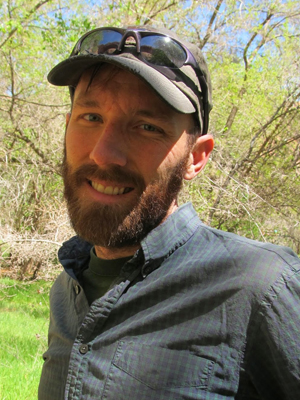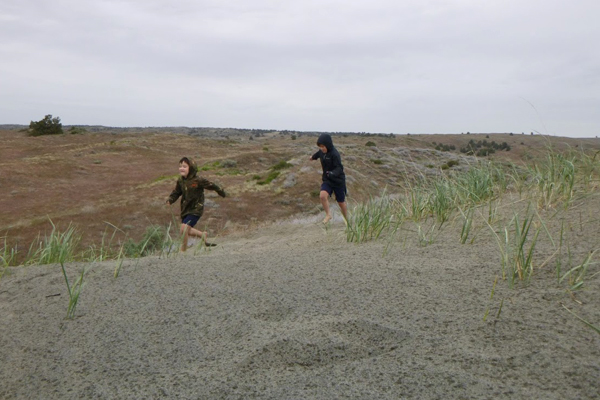Toads in the sand: How the Juniper Dunes Wilderness protects wildlife from motorized wreckreation
By Scott Crain

The Juniper Dunes Wilderness area is a 7000-acre part of the National Wilderness Preservation System, located in southeastern Washington State. It lies just a few miles north of what used to be a quiet part of the state, now exploding with population and development. The Hanford Nuclear Reservation lies a few miles to the southwest, one of the most polluted nuclear waste sites in the country. Just outside the barbed wire fence that surrounds Juniper Dunes lies an off-road vehicle area promoted by the Bureau of Land Management for ORVs and other motorized activities.
I was born and raised a few miles south in Pasco. When I was a kid, the Dunes, as we called them, were a place to go target shooting, driving four wheelers, and doing all sorts of other things that our parents didn't want to know about. I've moved on, but those activities continue unabated right up to the wilderness boundary.
Right after the pandemic hit and leaving your house became socially acceptable, my family took a beeline straight to the Wilderness to spend two nights in the desert. You haul all your water in. There are no trails and no established camps. And, unless you have an ORV, you need to hike at least a mile through the off-road vehicle trails to come near the boundary.
We climbed over the barbed wire to enter the Wilderness and found a large swale to shield some of the ORV and target shooting noise where we set our tent up. From the top of the dune above us we could see ORVs drive right up to the fence, and roar down the dunes with multicolored LED lights flashing on their fenders and roll bars.
We headed north for lunch to a large dune far off in the middle of the wilderness. While the kids played in the sand, I laid in the sage and napped. My older child eventually shouted, "Dad, I found a toad buried in the dune." As usual, he spotted wildlife no one else saw, and as usual, I didn't believe him at first. I should know better by now, but I looked and in his hand was sitting a spadefoot toad that had buried itself in the dunes. He gently set it back in the dune and covered it up again.
I wondered the rest of the day how many toads I'd walked over unseen in these dunes, and how many find the wilderness a refuge from the constant churning created by the ORVs outside the fence. It gave us a respect for the dunes and how we treat them in the future.
I've been on both sides of that fence now, and I definitely know which I prefer and which is sustainable for our planet and our health in the long run.
Scott is a lawyer for a nonprofit law firm serving low-income people in Washington. He lives in Seattle.
Editor's note:
“Wilderness Experienced” is a platform to share stories of recent experiences in Wilderness. Stories focus on the virtues of Wilderness and/or challenges facing the National Wilderness Preservation System.
Commenting guidelines:
We encourage readers to engage the authors and other commenters through the comment feature. Please be respectful and thoughtful in your response, and focus your comments on the issues/experiences presented. Please refrain from personal attacks and harassment, using rude or disruptive language, providing misinformation, or promoting violence or illegal activities. We reserve the right to reject comments. Thank you for your cooperation and support.
Click here to read another Wilderness Experienced story. See what you can do to defend America's National Wilderness Preservation System here.
When you subscribe to the blog, we will send you an e-mail when there are new updates on the site so you wouldn't miss them.
Contact Us
Wilderness Watch
P.O. Box 9175
Missoula, MT 59807
P: 406-542-2048
E: wild@wildernesswatch.org
Minneapolis, MN Office
2833 43rd Avenue South
Minneapolis, MN 55406
P: 612-201-9266
Moscow, ID Office
P.O. Box 9765
Moscow, ID 83843


Comments 53
I live in Desert Hot Springs CA and the off roaders are tearing up the ecosystem here too. They even use city streets to drive to their favorite desert spot even though their vehicles aren't street legal and don't have the same noise suppression (mufflers) that street legal vehicles have. The noise alone is a form of pollution and probably harms wildlife too along with the ecosystem destruction. Let's all hope for better days.
Vehicles and random shooting is destructive to the animals and the land the people that might want to enjoy a day or night in nature. protect this site please.
Let's protect the sand dunes in Washington State
Motorized vehicles destroy any natural area they are allowed in. They often do not stay on the designated roads or trails increasing their effect on the environment.
I remember when the Juniper Dunes were part of the 1984 Washington Wilderness Bill that I helped with a bit when I was a graduate student at Washington State University. Glad they are still there, however hemmed in they may be. Thanks for your essay, Scott.
Wilderness must be Protected. Too many of us don’t understand the Damage inflicted on Public Lands by motorized recreation. Wilderness is best enjoyed on its own level, quietly & slowly.
Wilderness is for animals only.
A college friend and I visited the Juniper Dunes Wilderness around 2010. I can't even remember how we zeroed in on going there. As backpackers, we stood out in a sea of dune buggies hiking to the boundary line. We were mortified by the ORVs riding right up to the boundary of the Wilderness. There is no buffer zone at all. That's the Bureau of Land Management for you. They are probably the least qualified federal agency to protect a Wilderness area (thought WW might argue the National Park Service is worse). The BLM's website days, "The Juniper Dunes Wilderness preserves the northernmost growth of western juniper, some of which have been around for 150 years, along with windswept sand dunes measuring 130 feet in height and 1200 feet in width." It's a pretty unique place.
I think you do a great job keeping everyone informed. But the wilderness area should be free of vehicles all kinds. The wildlife needs our protection. and vehicles do not belong on sand dunes.
The ORVs do stay outside the designated Wilderness (at least I hope they do) but similar ecosystems surround the wilderness and that's where the ORV activity takes place. It's a real night-and-day comparison to see what happens to nature when you let vehicles run amok.
HIKE IN HIKE OUT LEAVE THE MOTORIZED PARKED ON THE ROAD OR TUCKED AWAY UNSEEN
Wildlife animals belong to wildlife. Any type of the motor vehicles should have their own land for enjoyable of riding around & should not scare wildlife animals with the scary of the sounds of the motors. Let all the wildlife animals feel comfortable living in their own wildlife without the sound of the motors.
Save the Dunes! Save the wildlife!!
The wilderness is there for people to enjoy a landscape free of technology and the noise and pollution of motorized vehicles. These vehicles should be kept well distant from the borders of protected areas
Please protect the Dunes from polluting noisy machines. There are many recreational facilities where they can be enjoyed and promoted. But please keep the wilderness areas sacrosanct, and protect the habitat and solitude for wildlife AND humans, who need this space as a contrast
to the fast paced noisy environment to which they are often by necessity, subjected.
In these times people, especially children , need a quiet place to regenerate.Loud noisy machines have no place on our trails.
Fight back! The BLM is another corporate shill.
American Citizens deserve better and OUR voices need to be heard above the destructive nature of Greedy Corporations and rampant Ignorance.
We ALL need to protect these extraordinary places and ALL WILDLIFE who inhabit these places, in order to remain connected to this earth, it is not only about the salvation of the planet, but it is also about the salvation of ourselves.
Save the Endangered Species Act!!!
Seems like a great place for recreational vehicles. Nice and far away. Just because I don't ride doesn't mean others can't. We need to get along with each other. Men especially need to let their testosterone play. I am sure I will get attacked for not agreeing.
We all love to go somewhere that we wouldn't normally get to see. And when the journey is made simple and easy, it's hard to resist. I believe that we need to remember that the ecosystems we find so attractive have been created through eons of time and massive effort on the part of nature. A quick joy ride, no matter how intimate could easily destroy thousands of years of nature's effort. It's hard to see how ridding down a designated trail can compromise the wilderness until you visit a place that was once pristine, and now, years after you were there, the place has changed, has been degraded, has ceased being the apexof primitive all becuase the limits to access were reduced. It's heartbreaking to such areas spoiled by convenience. Limiting access may mean that some don't get to visit, but it also means that those who make the effort will find these micro-ecosystems in near "original" condition for a long, long time to come.
The public, me own this land. Leave it pristine. Dismantle the BLM, they are corrupt.
"That BLM promotes ORV use right outside a Wilderness area is part of why most BLM land should be transferred to a real conservation agency."